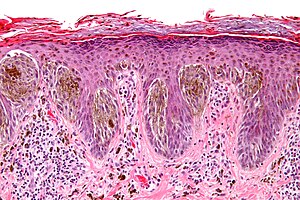Spitz nevus
Jump to navigation
Jump to search
| Spitz nevus | |
|---|---|
| Diagnosis in short | |
 Spitz nevus. H&E stain. | |
|
| |
| LM | nests of cells (spindle, epithelioid or spindle/epithelioid) - in both dermis and epidermis - nests are vertically arranged ("hanging bananas"), +/-hyperkeratosis, +/-hypergranulosis, +/-acanthosis (thick stratum spinosum), Kamino bodies - dense eosinophilic bodies (rare in melanoma) |
| LM DDx | malignant melanoma, pigmented spindle cell nevus of Reed |
| Stains | HMB-45 -ve deep aspect, Ki-67 usu. low |
| Site | skin - typically face or extremity |
|
| |
| Clinical history | children and adolescents |
| Prevalence | uncommon |
| Prognosis | benign |
| Clin. DDx | melanoma, other melanocytic lesions |
Spitz nevus, also known as epithelioid and spindle cell nevus, is an uncommon melanocytic lesion that can be difficult to differentiate from malignant melanoma.
General
- May be very difficult to differentiate from melanoma.
Epidemiology:
- Children & adolescents.
Treatment:
- Complete excision.[1]
Gross
- Usually face or extremity.[2]
Microscopic
Features:[3]
- Architecture:
- Nests of cells (spindle, epithelioid or spindle/epithelioid) - in both dermis and epidermis.
- Nests are vertically arranged, i.e. the long axis of the nests are perpendicular to the skin surface.
- Nest arrangement/orientation described as "cluster of bananas".
- Nests are vertically arranged, i.e. the long axis of the nests are perpendicular to the skin surface.
- Nests of cells (spindle, epithelioid or spindle/epithelioid) - in both dermis and epidermis.
- +/-Hyperkeratosis (more keratin, i.e. thick stratum corneum).
- +/-Hypergranulosis (thick stratum granulosum).
- +/-Acanthosis (thick stratum spinosum).
- Kamino bodies (also written Camino bodies) - dense eosinophilic bodies.[4]
Notes:
- Never in the setting of solar elastosis.[7]
- If there is solar elastosis -- it's melanoma.
DDx:
- Malignant melanoma - so-called Spitzoid melanoma.
- Pigmented spindle cell nevus of Reed.
Images
www:
IHC
- HMB-45 -ve at deep aspect.
- Ki-67 low.
See also
References
- ↑ Gelbard, SN.; Tripp, JM.; Marghoob, AA.; Kopf, AW.; Koenig, KL.; Kim, JY.; Bart, RS. (Aug 2002). "Management of Spitz nevi: a survey of dermatologists in the United States.". J Am Acad Dermatol 47 (2): 224-30. PMID 12140468.
- ↑ Busam, Klaus J. (2009). Dermatopathology: A Volume in the Foundations in Diagnostic Pathology Series (1st ed.). Saunders. pp. 449. ISBN 978-0443066542.
- ↑ Humphrey, Peter A; Dehner, Louis P; Pfeifer, John D (2008). The Washington Manual of Surgical Pathology (1st ed.). Lippincott Williams & Wilkins. pp. 499. ISBN 978-0781765275.
- ↑ Kirkwood, John M.; Jukic, Drazen; Averbook, Bruce J.; Sender, Leonard S. (October 2009). "Melanoma in Pediatric, Adolescent, and Young Adult Patients". Semin Oncol. 36 (5): 419-31. PMC 2797485. https://www.ncbi.nlm.nih.gov/pmc/articles/PMC2797485/.
- ↑ Skelton, HG.; Miller, ML.; Lupton, GP.; Smith, KJ. (Dec 1998). "Eosinophilic globules in spindle cell and epithelioid cell nevi: composition and possible origin.". Am J Dermatopathol 20 (6): 547-50. PMID 9855349.
- ↑ Wesselmann, U.; Becker, LR.; Bröcker, EB.; LeBoit, PE.; Bastian, BC. (Dec 1998). "Eosinophilic globules in spitz nevi: no evidence for apoptosis.". Am J Dermatopathol 20 (6): 551-4. PMID 9855350.
- ↑ Jakubovic, H. 16 July 2010.


